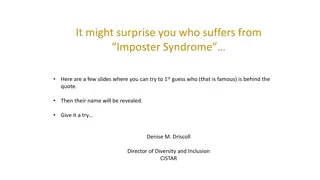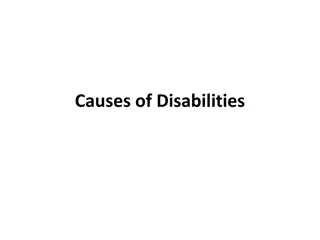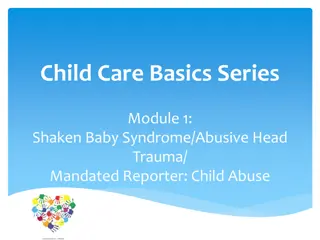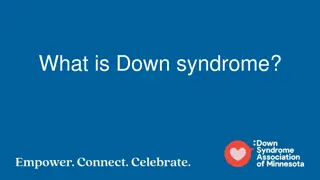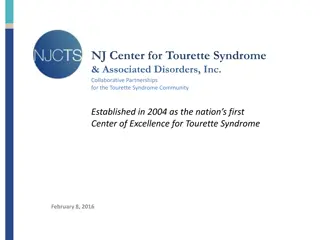Understanding Imposter Syndrome: Causes, Effects, and Overcoming Strategies
Imposter Syndrome is characterized by feelings of inadequacy despite evidence of success, chronic self-doubt, and fear of being exposed as a fraud. It affects individuals' work performance, leads to avoidance of additional duties, assigns success to external factors, and can result in burnout. However, overcoming imposter syndrome involves awareness, open discussion, acceptance of imperfection, and challenging negative thoughts. It is estimated that 70% of people will experience imposter syndrome in their lifetime, but it should not deter individuals from achieving their full potential.
Download Presentation

Please find below an Image/Link to download the presentation.
The content on the website is provided AS IS for your information and personal use only. It may not be sold, licensed, or shared on other websites without obtaining consent from the author. Download presentation by click this link. If you encounter any issues during the download, it is possible that the publisher has removed the file from their server.
E N D
Presentation Transcript
Imposter Syndrome Imposter Syndrome
DEFINITION: Feelings of inadequacy despite evidence of success Chronic self-doubt Feelings of intellectual fraudulence despite proof of competence
Prevalence Prevalence 49.4% females vs. 23.7% males 30% Asians & whites vs. 72.7% all other races Villwock, J. A., et al. (2016). "Impostor syndrome and burnout among American medical students: a pilot study." Int J Med Educ 7: 364-369.
Work Performance: Work Performance: Fear of inability to manage or deliver Hold self back Fear of doing things wrong can impact overall performance
Avoid additional duties Worry about additional duties will decrease the overall quality Assuming Responsibilities Assuming Responsibilities
Attribute Success Attribute Success Success due to outside factors Defeat blame themselves
Burnout Burnout Attempting to overcome sense of inadequacy can lead to burnout Even if not experiencing job satisfaction fearful of change
Overcoming Overcoming Be aware Talk about it Understand perfection is not possible Challenge negative thoughts
Thinking your way out of imposter syndrome by Valerie Young
Alexandra Owens reports that it is estimated that 70% of all people will experience one incident of imposter syndrome in their lifetime. DO NOT LET IMPOSTER SYNDROME STEAL YOUR ABILITY TO SHATTER YOUR EXPECTATIONS



